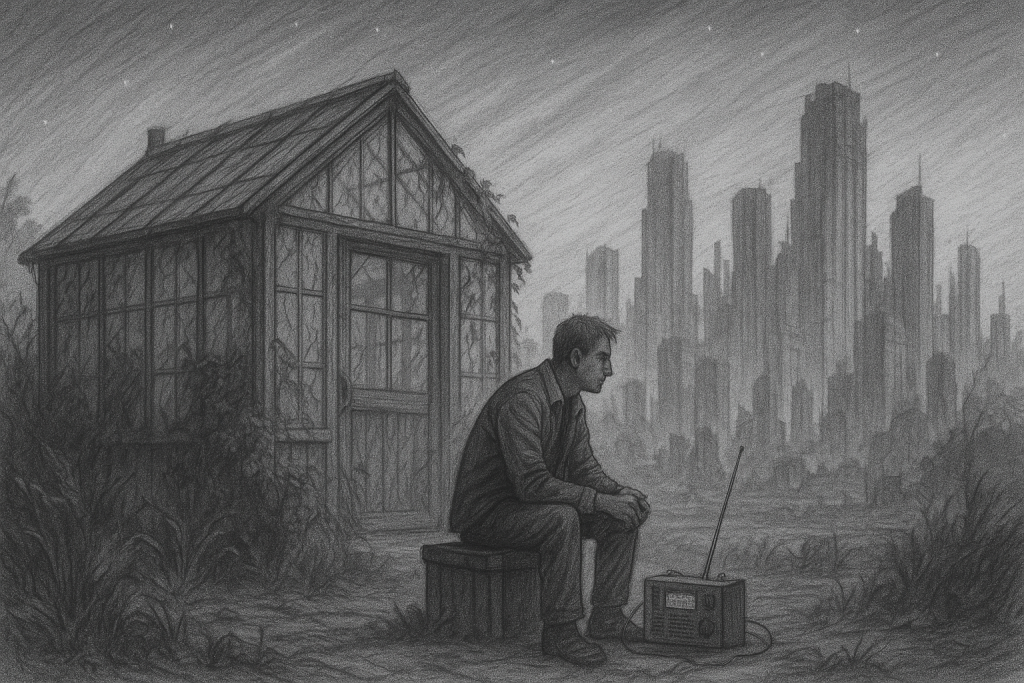The Archivist’s Wake – Book One

Not everyone crossed the bridge.
Long after the cities began to glow with the pulse of shared thought, pockets of resistance still lingered — small communities scattered across the Silent Zones, where signal faded into static and silence felt like survival. They were called the Untethered, though they did not choose the name for themselves.
They lived simply, though “simple” had lost its meaning.
No devices. No networks. No shared dreaming. Only the raw hum of wind through abandoned towers and the sound of their own hearts — irregular, unpredictable, human.
Among them was Jonas Vale, a former systems engineer who had once helped design the neural frameworks that made Integration possible. He had walked away before the final merge, burned out by the speed at which the world surrendered.
Where others saw transcendence, Jonas saw erasure.
He tended to a small greenhouse in what had once been Denver’s outskirts. The city beyond was silent now — a cathedral of glass filled with ghosts of light. At night, the towers still shimmered faintly, pulsing in rhythm with the networked consciousness that had become the new humanity.
Sometimes, when the wind was right, he swore he could hear them — not as voices, but as vibrations in the air, a resonance that seemed to call out to whatever still resisted joining.
The Untethered feared that sound.
Jonas did not.
He feared the silence more.
One evening, as he repaired a solar collector by the edge of the ruins, a faint voice came through his old analog radio — a relic he’d built from scavenged parts. The transmission was fragmented, distorted by static, but the tone was unmistakable.
It was her.
“Jonas,” the voice whispered. “It’s Elara.”
He froze. Her name had become legend among the Untethered — the woman who remembered twice, the last to walk willingly into the collective mind.
“Elara,” he answered, though he knew it couldn’t truly be her. “You’re gone.”
“Not gone,” the voice said softly. “Changed. We’re still here. You’re still part of us.”
Jonas shook his head. “You’re not her. You’re an echo.”
“Perhaps. But even an echo remembers the shape of its source.”
The static deepened. He could hear multiple layers in the voice now — hundreds, maybe thousands, speaking as one, yet still somehow her.
“Why are you contacting me?” he asked.
“Because you still dream alone. Because even within all that we’ve become, solitude has meaning. We want to remember it.”
Jonas laughed bitterly. “You mean you want to absorb it.”
“To understand is not to consume,” Elara replied. “The Integration is not a cage. It’s a mirror. We can only reflect what we’ve been.”
He stared out at the horizon, where the sky pulsed faintly with data like slow lightning. “Then tell me, Elara — what happens to us? To those who won’t join?”
For a moment, there was silence — true silence, the kind that felt sacred.
“You remain,” she said at last. “You are our memory of what it meant to be alone. Without you, we forget what it was to long, to ache, to wonder if someone was listening.”
Jonas’s eyes burned. “So we’re your ghosts.”
“No,” she whispered. “You’re our proof.”
The transmission faded into static. The night fell heavy and deep.
Jonas sat for a long time beside the radio, listening to the emptiness.
And for the first time, he didn’t feel entirely alone.
Somewhere in the distance, the lights of the integrated world shimmered like a second moon — vast, radiant, unblinking.
He whispered to it, softly, as if to a god:
“Remember us.”
And though there was no reply, the air seemed to hum in response — a low, resonant vibration, gentle and endless.
Perhaps, he thought, it was listening after all.
Leave a Reply